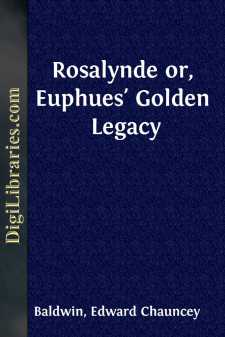Categories
- Antiques & Collectibles 13
- Architecture 36
- Art 48
- Bibles 22
- Biography & Autobiography 813
- Body, Mind & Spirit 142
- Business & Economics 28
- Children's Books 17
- Children's Fiction 14
- Computers 4
- Cooking 94
- Crafts & Hobbies 4
- Drama 346
- Education 46
- Family & Relationships 57
- Fiction 11829
- Games 19
- Gardening 17
- Health & Fitness 34
- History 1377
- House & Home 1
- Humor 147
- Juvenile Fiction 1873
- Juvenile Nonfiction 202
- Language Arts & Disciplines 88
- Law 16
- Literary Collections 686
- Literary Criticism 179
- Mathematics 13
- Medical 41
- Music 40
- Nature 179
- Non-Classifiable 1768
- Performing Arts 7
- Periodicals 1453
- Philosophy 64
- Photography 2
- Poetry 896
- Political Science 203
- Psychology 42
- Reference 154
- Religion 513
- Science 126
- Self-Help 84
- Social Science 81
- Sports & Recreation 34
- Study Aids 3
- Technology & Engineering 59
- Transportation 23
- Travel 463
- True Crime 29
Rosalynde or, Euphues' Golden Legacy
Description:
Excerpt
INTRODUCTION
Birth and Education. Of the life of Thomas Lodge comparatively little is definitely known. Yet, though even the year of his birth is uncertain, we are able from the meager facts that have come down to us to see that his life was typically Elizabethan. Like Sidney and like Raleigh, Lodge lived a varied and active life. He was born in either 1557 or 1558 of a rather prominent middle-class London family, both his father and his mother's father having been lord mayors of the city. He was sent to Merchant Taylors' School and afterwards to Trinity College, Oxford, where he graduated in 1577. Of his career at the university we know almost nothing except that among his fellow students were John Lyly, destined to exert a powerful influence upon his style, and George Peele, later to become a dramatist of note, to whom Lodge may to some extent have owed his subsequent interest in the drama.
Early Work. After leaving Oxford, Lodge returned to London and entered the Society of Lincoln's Inn, in other words took up the study of the law. Legal studies seem not to have absorbed his attention to the total exclusion of literary work. The occasion of his first publication was the death of his mother in 1579. In that year appeared the "Epitaph of the Lady Anne Lodge." This is not extant, but his reply to Stephen Gosson's "School of Abuse" has survived. Gosson's book had been a furious attack upon the contemporary drama. Lodge's reply was a fair sample of the literary billingsgate of that controversial age and deserves the oblivion into which it promptly sank. His next publication was his "Alarum against Usurers" (1584), a book belonging to a class of tracts popular in that day in which the characters and customs of the underworld of London were exposed to popular execration. The impulse to engage in this journalistic kind of work Lodge may have owed to Robert Greene, the dramatist, with whom he at this time became intimate, and whose popular books on cony-catching the "Alarum," in its spirit and purpose, closely resembles. Greene certainly furnished some of the inspiration for the dramatic attempts that followed. Lodge's play, "The Wounds of Civil War," though not printed till 1594, may have been acted in 1587. We know that he collaborated with Greene in "A Looking Glass for London and England," produced in 1592.
Later Work and Death. It is not, however, as a dramatist that Lodge is remembered, but as a writer of pastoral romance. Here the discursive and idyllic quality of his genius, both in verse and prose, was to find complete and unhampered expression. Of the pastoral romances that Lodge produced during the next decade "Rosalynde" is by far the most important. The author wrote it, he tells us, while he was on a freebooting expedition to the Azores and the Canaries, "when every line was wet with a surge, and every humorous passion counterchecked with a storm." The immediate success of "Rosalynde" encouraged Lodge to continue the writing of romances. The best known of those that followed, and one of the prettiest of his stories, is "A Margarite [i.e....


